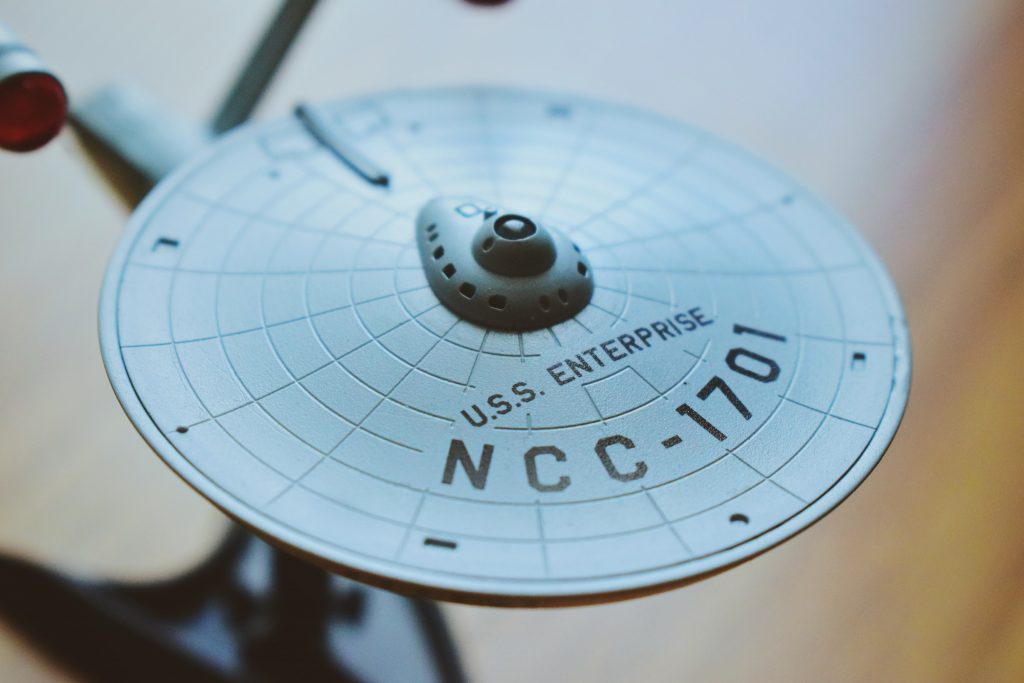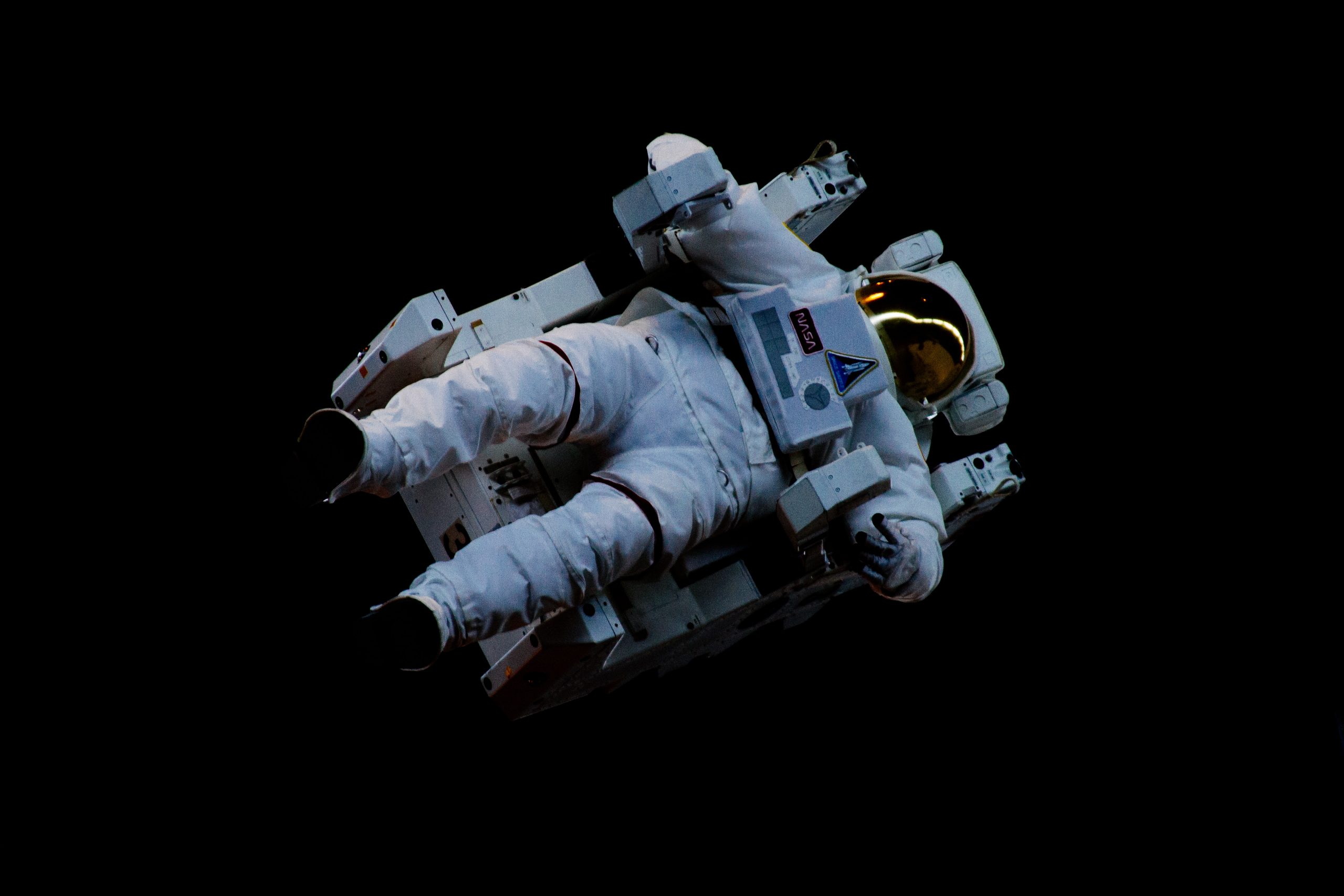Spoiler-Alert!
This article contains heavy spoilers for the first episode of the first season of Star Trek: The Next Generation, “Encounter at Farpoint”, and light spoilers for the continuation of the series.
The universe, infinite expanses – Star Trek has always meant one thing to me above all: longing for a future that is better than what we are currently experiencing on earth. Gene Roddenberry, the creator of the still-evolving franchise, managed to capture the longing for peace in images. Being the humanist that he was, he created a universe in which people have left the problems of the present behind, in which no child has to starve or flee from war anymore. Earth becomes a utopia.
So now that humanity seems to have managed to solve its own problems, it can afford the luxury of looking outwards. After all, we are offered a whole universe full of possibilities. Who among us hasn’t looked up at night and wondered if space has more to offer than freezing cold? Why else would we send people out to investigate what is just within our reach? We are curious and test our limits. We want to know what else is out there.

In the Star Trek universe, the galaxies reveal an almost indescribable potential, alien worlds and new civilisations. The starship Enterprise is just one of many that sets out to explore them. Technology, beauty and strangeness await all who dare the journey. Unfortunately, the crew around Captain James T. Kirk in the first Star Trek series “Star Trek: The Original Series” (TOS), which first appeared on the screens in the mid-1960s, had to realise that not all peoples out there were as peaceful as humans were. The structure of the early episodes was always similar: At the beginning there is a distress call or a request. The Enterprise rushes to help. Not infrequently, the crew encounters beings that display their apparent superiority, prove to be a threat and sometimes threaten entire peoples. With the help of the cleverness of the protagonists of the series, however, the conflict is always resolved in favour of the crew, with very few exceptions. Humanity becomes a symbol of hope for the weak and oppressed.
A NEW GENERATION – A NEW DAWN
At the beginning of Gene Roddenberry’s second series, “Star Trek: The Next Generation” (TNG), the tables are turned. In the pilot episode “Mission Farpoint” (TNG S01E01 and E02), the humans are in no way superior to the alien being they encounter.
Undoubtedly, the first appearance of the superior – but not omnipotent (see also “Star Trek: The not quite omnipotent Q”) – Q is an unusual one. When a barrier in empty space opens up in front of the Enterprise, making further flight impossible, a man dressed in shimmering armour suddenly appears on the bridge and demands in medieval language that humanity withdraw from space. Even the new captain, Jean-Luc Picard, can only frown worriedly in the face of the absurdity of the situation. Even if the viewer may smile at this point, the seriousness of the motif of this episode becomes apparent only a few seconds later.
Q: But you can’t deny that you’re still a dangerous, savage child race.
From the transcript of the episode
PICARD: Most certainly I deny it. I agree we still were […] four hundred years ago.
Q: At which time you slaughtered millions in silly arguments about how to divide the resources of your little world. And four hundred years before that you were murdering each other in quarrels over tribal god-images. Since there are no indications that humans will ever change.
Q demands, as punishment for the crimes of humans, that they stop exploring space and interfering in the problems of other worlds. A species that has been at war with itself for so long, how could it mean anything good for other worlds? Q would have the power to stop humanity’s interference. In a bizarre court case he wants to underline the guilt of mankind and show that humans have not changed over the millennia: They are a bloodthirsty, warlike people. The fact that Q himself participates in the trial as judge, prosecutor and (only) juror does not exactly improve the chances of the crew of the Enterprise to defend humanity, whose representative they are assigned. For this she is put to the test.
At this point I would like to warn of a minor spoiler, because I will resolve how the trial ends. Based on the fact that several more seasons, series and films were released following this episode, you can already guess that the crew succeeds in convincing Q that humans are good. To do this, they solve the mystery surrounding Farpoint Station, a space station where all material desires come true in an almost magical way. However, the station is threatened by an unknown force from space, and everyone on the station seems to be in danger. When it turns out that the magic of the station is due to a giant, jellyfish-like creature that was enslaved by the non-human but humanoid owners of the space station and now a second of these creatures is trying to save it from space, a conflict develops that is on the verge of escalating. In the end, however, the crew manages to free the captured being without violence. I should not forget to mention, however, that those who enslaved it did not escape unscathed, as the station is completely destroyed, even if those present could be evacuated beforehand.
The successful mission is enough to convince Q that humanity is capable of more than violence. I find that a little surprising. Is that all it takes to change his mind? At the beginning of the episode, Q had listed a selection of past wars and some that are still ahead of us – from the perspective of the current viewers. Picard says at one point, “We humans know our past, even if we are ashamed of it.” I agree, we humans know our past and some of us are certainly ashamed of the bloody history of our planet, but we have by no means overcome what is meant here. There is still far too much suffering in the world, for which we alone are responsible. How many wars are raging on earth at the moment? How many people flee their homes every day in search of peace and security?
THREE HUNDRED CUBITS LONG, FIFTY CUBITS WIDE AND THIRTY CUBITS HIGH
The hope that by the time of Star Trek we will have overcome all this – and become something of an intergalactic role model – is, despite all this, not groundless. It feeds on the moments when people through the ages act for each other and not against each other. It shows itself where there is kindness and where conflicts are not resolved by force of arms. But is that enough not to condemn humanity?
The whole scene reminds me very much of a biblical story. Here, too, humanity as a whole – with one minor boat-building exception – was punished for its bad actions. It’s hard for me to believe that apart from Noah and his family, no one was actually worth saving, but that’s a moot point at this point.
And God said to Noah, “I have determined to make an end of all flesh, for the earth is filled with violence through them. Behold, I will destroy them with the earth.”
Gen 6:13
As in the themed Star Trek episode, the story of the Ark refers to violence as the reason why humanity must be judged. It is proof that creation is not good enough, God therefore sent the Flood which destroyed almost all life on earth. A drastic judgement. Only one was spared this sweeping condemnation: “Noah was a righteous, blameless man among his contemporaries.” (Gen 6:9) He and his family survived because God saw the good in him, just as Q learned to see the good in Picard and his crew.
But I don’t want to stretch the parallels. In that logic, Q should only have spared the Enterprise. Also, collective annihilation was never in question, only the prohibition of further space exploration. Especially from Gene Roddenberry’s perspective, however, this threat is fatal, since he considered the human desire for knowledge and understanding to be a defining virtue. But Q, at the end of Mission Farpoint, lets all humans continue to reach for the stars. Why? Hasn’t Farpoint Station only proved that the crew members of the Enterprise are peaceable?
The Lord said in his heart, “I will never again curse the ground because of man, for the intention of man’s heart is evil from his youth. Neither will I ever again strike down every living creature as I have done.
Gen 8:21
After mankind has been almost destroyed, God swears never again to pass such judgement. This is by no means to say that evil in people has been eradicated, but instead it seems to be accepted. As sinister as this may sound, it means that human beings are capable of also being good, contrary to expectation; there have always been such people: If even one person can be just and blameless, all can.
The fact that there are also those in humanity who actually strive for peace is what is important – as long as there are people who are good and just, there is hope that at some point wars will no longer cause children to lose their families, their homes. It sounds like a utopia, but that doesn’t mean we can’t all play a part in it.

